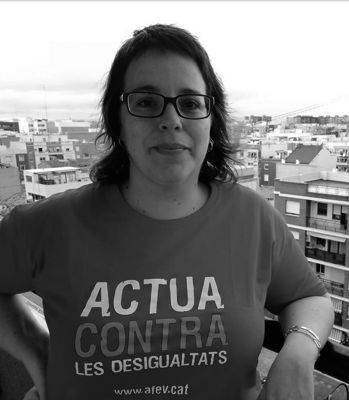Welcoming refugee children and youth in a mentoring project in Valencia

WORKSHOP LED BY IRENE ESTEBAN
Irene Esteban Molina, Degree in Psychology and specific training in Feminist Psychotherapy and Social Transformation. She has worked directly with children and adolescents as a Street Educator (Humanes, Madrid), as a Social Educator at a minor centre (Sabadell) and as an Informer at the Youth Center of Les Corts (Barcelona). Experience with invigorating youth groups, group cohesion training, gender roles, power dynamics, leadership and conflict resolution. In addition, she is an activist in a number of struggles, such as feminism, and she posesses an important knowledge in feminisms: feminist practices with peer groups and assemblyism, the development of sexist-free activities, feminist economics, decolonizing feminisms, feminist theory, as well as prevention, sensitization and answers to sexist violence.
Currently responsible for Socioeducational Mentoring at AFEV Valencia with the enTandem project, the only mentoring project of Coordinadora de Mentoria Social (CMS) in País Valencià, which is in the final stage of processing the Quality Seal. During the past academic year, Esteban led the pilot project with children and young refugees in Valencia, together with CEAR País Valencia.
ABSTRACT
enTàndem is a project that exists for almost 12 years in Barcelona. When AFEV decided to implement it in the city of Valencia, the primary actors to collaborate were CEAR and València Acull, both organisations that work with refugees. When we escalate our project in a new setting, we always have to adapt it to the new context, actors and needs. But in the case of Valencia it was a big challenge because the reality of ALL the mentees is that they were refugee children.
enTàndem is based on the cooperation between AFEV, that is in charge of searching, training and monitoring the mentors among students primarily (from 18 to 30 years old), and other local organisations that know and select the potential mentees. The pilot project began on the school year 2018-19. We created 15 matches in 6 neighbourhoods of the Metropolitan Area of Valencia. Our mentors were mainly university students and our mentees were mainly (90%) refugee kids that had arrived in the city less than one year before. For the present year we are continuing the project with these actors and new ones, and we are following up to 40 matches.
The fact of having to develop mentoring relationships with mentees of such diverse
characteristics (different languages, origins, administrative situations, religious backgrounds, etc) posed several challenges last year that we could have faced before in our regular project in Barcelona but that were deepened and pervasive in Valencia.
Such as:
- Instability and fear of the mentees and their families.
- Living situation precarity and changes of residence.
- Extreme economic vulnerability.
- Language barriers and misunderstandings.
- Traditions and customs of the daily life of the kids and the families
- Extreme diversity in the same group of mentees (form Syria to Colombia, Ukraine and Cambodia), that made it more difficult to provide a proper training and information about cultural and geographic backgrounds.
- Legal barriers (for instance in the publication of images…)
Also, of course, the project led to great advantages for this public (i.e., knowing the city, means of transportation, traditions, educational and cultural public resources, social networking) which have to be also taken into account when deciding to implement an intervention with families of a refugee origin. Our aim with the activity that we are presenting in the Summit is to expose and exchange these challenges and advantages with other organisations that have the experience or the idea of working with refugee public through mentoring. Some questions that we could arise are: How could we properly train our mentors to be prepared to face the challenges of accompanying minors that are in an administrative situation of exile or refugees? What are the educative objectives that we should search for when working with refugee kids? Which are the intercultural aspects that should be taken into account as an organisation to cooperate with the kids and the families, in order to improve the
communication, trust and effectiveness of the mentoring relationship? Among others that we expect that will stem from the debate itself.
